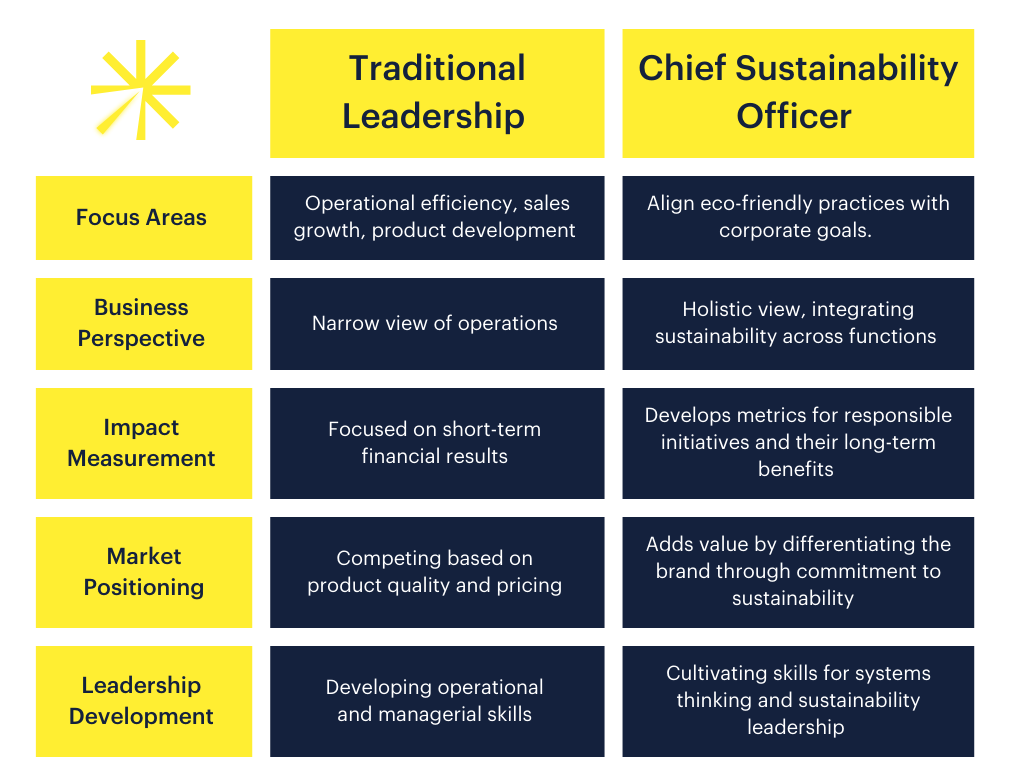Our world is becoming more conscious than ever. Customers care where their food comes from, the process utilized in the making and how ethical and healthy the products they buy are. As an executive search partner where most of our clients come from the Food and Beverage sector, I have recognized a rising need for the Chief Sustainability Officer (CSO) role. This position is crucial in such a competitive industry where clients are very difficult to please. It is a challenging task to be on top of responsible practices, environmental impact, and consumer health, while also aiming to achieve profitability and growth and that is where CSO comes in hand.
The Role of Chief Sustainability Officer (CSO)
A CSO task is to integrate sustainable practices into every aspect of a company’s operations, from sourcing ingredients to production methods and packaging. As consumer demand for transparency and responsible sourcing increases, the CSO ensures that organizations proactively engage in environmental practices as well as comply with regulations.
Why Companies Are hiring CSOs
- Environmental Responsibility: With growing awareness of climate change and resource scarcity, companies are under pressure to minimize their environmental footprints. According to a 2021 survey by McKinsey, 70% of consumers are willing to pay more for brands that are ecofriendly.
- Regulatory Compliance: As governments restrictions and regulations grow on food safety, waste management, and emissions, having a CSO ensures that the organization is prepared, and it is protected from any legal complication regarding these issues. The World Economic Forum estimates that up to 70% of consumer goods companies could face regulatory penalties if they do not comply with new regulations.
- Long-term Profitability: Considering the stats above, sustainability has also become a business strategy. A report from the Harvard Business Review indicates that companies that include responsible practices in their strategies are 5.2 times more likely to experience higher operating performance in the long term. Companies that comply well with this often experience improved efficiency and enhanced reputation ultimately leading to long-term profitability.
Traditional Leadership vs CSO Leadership 
Key Benefits of Hiring a CSO
- Holistic Strategy Development: CSOs can align sustainability initiatives with overall business strategies, ensuring that sustainability becomes a core aspect of the company’s mission rather than an afterthought. A study by Deloitte found that organizations with a sustainability strategy can achieve 20% higher growth than those without.
- Cross-Functional Collaboration: Effective strategies require collaboration across departments. A CSO fosters relationships between R&D, marketing, supply chain, and production teams to create cohesive sustainability efforts. Research indicates that companies with cross-functional teams can achieve 40% faster project completion.
- Enhanced Brand Reputation: By prioritizing sustainability, companies can differentiate themselves in a competitive marketplace. According to Nielsen, 66% of global consumers are willing to pay more for sustainable brands, appealing to environmentally conscious consumers and enhancing brand loyalty.
- Resilience to Market Changes: As consumer preferences shift toward more conscious options, companies with a strong sustainability framework are better positioned to adapt and thrive in evolving markets. A study by the Ellen MacArthur Foundation found that transitioning to a circular economy could generate $4.5 trillion in economic benefits by 2030.
Challenges in the CSO Role
- Integration into Existing Structures: One of the greatest challenges for a CSO is becoming an integral part of the existing leadership team and company culture. They must establish processes while driving necessary changes.
- Measuring Impact: Demonstrating the ROI of responsible initiatives can be challenging. CSOs need to establish metrics to measure success and communicate these to stakeholders effectively. A survey from PwC indicates that 52% of sustainability leaders struggle to quantify the benefits of their initiatives.
The Future of Food and Beverage Leadership: Executive Search
In conclusion, the role of the Chief Sustainability Officer represents a transformative shift in leadership within the food and beverage industry. By integrating sustainability into their business strategies, companies enhance their competitive advantage on a long-term view. As the demand for sustainable practices continues to rise, executive search services become an ally to add the necessary executive talent to your team.

Lorenzo Zavala
Mr. Zavala is the founder of Zavala Civitas and has over 30 years of experience in executive search and leadership consulting, specializing in helping multinational corporations expand into new countries and sectors. Previously, he was a partner at Russell Reynolds, where he served as Managing Director and established offices in Mexico, Argentina, and Brazil. For the past five years, he has lectured on leadership, influence, and power at ESADE Business School in Madrid and Barcelona, as well as IUE in Florence. He is fluent in Spanish, English, German, and Portuguese.










